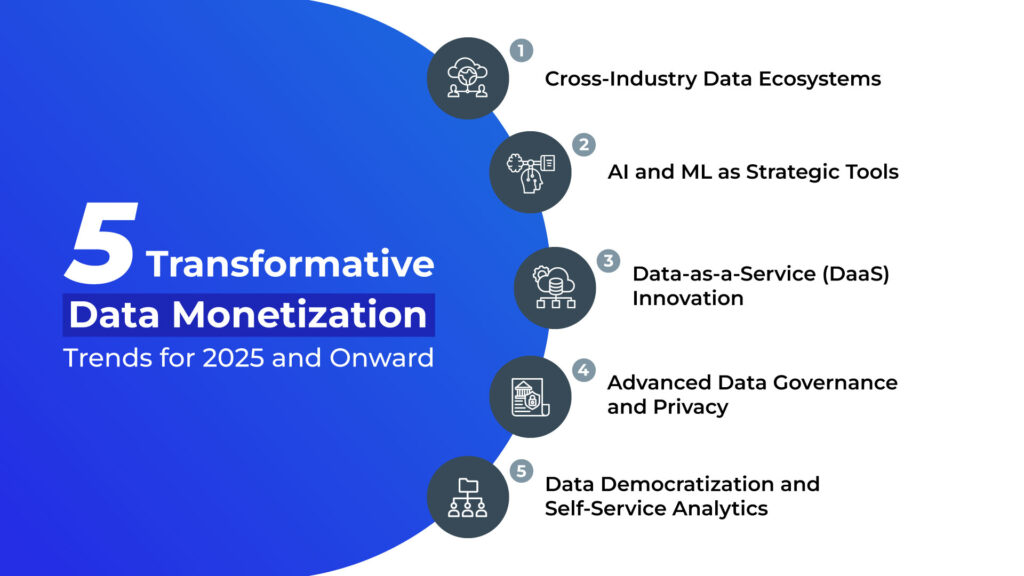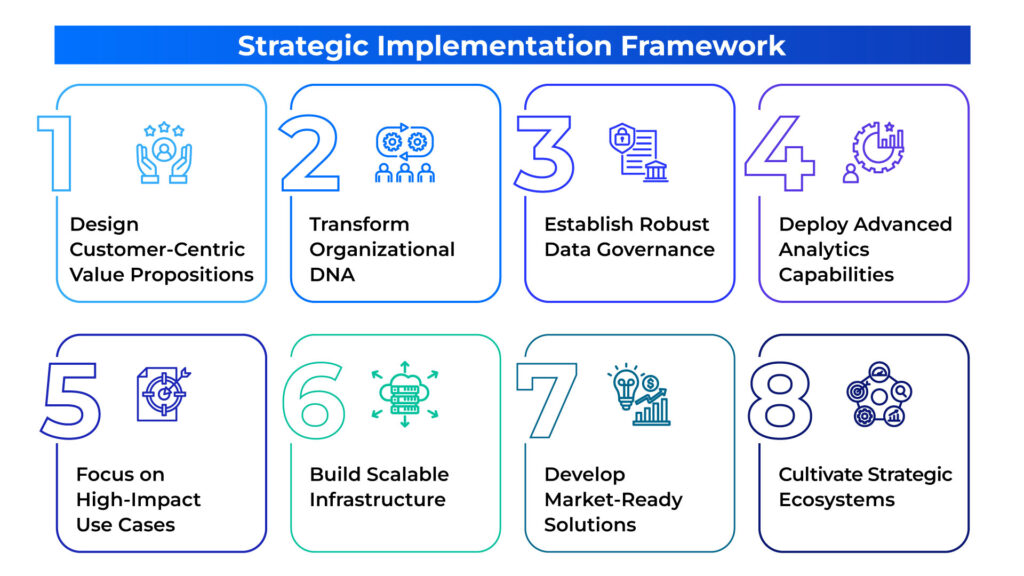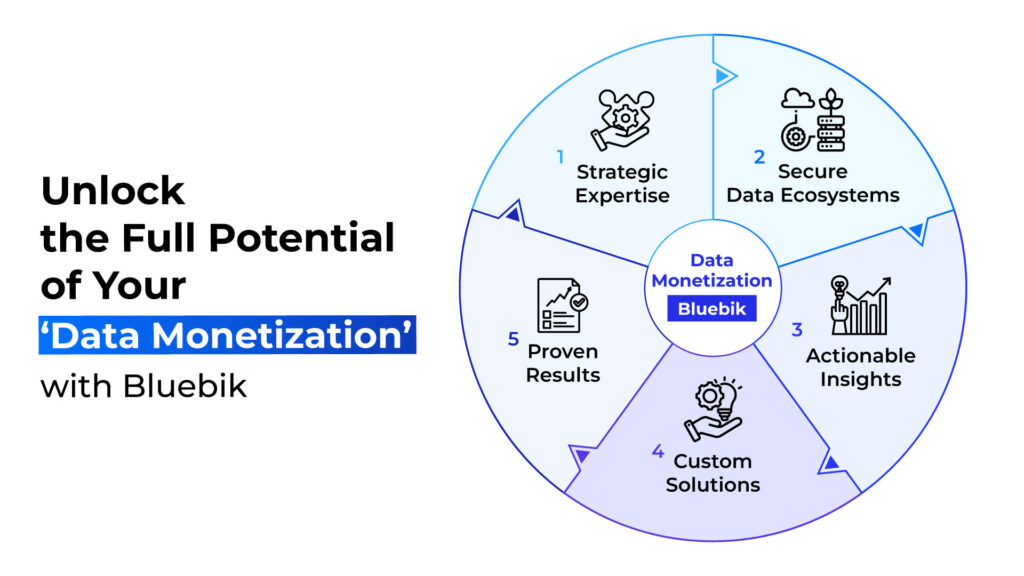Strategic Insights for Maximizing Data Value in the Digital Economy
In Brief
- Data Monetization Trends on the Rise: Five game-changing trends that will revolutionize how businesses create value from data in 2025 and onward
- Data Monetization Challenges & Solutions: Address pivotal challenges in privacy, technology, and ethics, and discover strategies that differentiate industry leaders from their competitors.
- Optimized Data Management: Leveraging emerging technologies, build powerful ecosystems, and establish standardized of governance to stay ahead
- Successful Data Monetization Framework: Unlock data’s potential to address critical challenges and create new business opportunities for sustainable growth.
The Evolution of Data as a Strategic Asset
In today’s digital economy, data has evolved beyond an operational byproduct to become the cornerstone of organizational success. Leading enterprises now recognize data as a critical driver of innovation, competitive advantage, and sustainable growth. Through data monetization—the process of transforming raw data into actionable insights and tangible business value—organizations are pioneering new pathways for innovation that reshape industries and establish long-term market leadership.
However, organizations face significant challenges in this journey. These include rapidly evolving privacy regulations, integration of complex technologies, ethical considerations, and the need to demonstrate clear return on investment (ROI). Addressing these challenges requires both technical expertise and a strategically aligned approach.
5 Transformative Data Monetization Trends for 2025 and Beyound

1. Cross-Industry Data Ecosystems
Opportunity: Organizations are building collaborative data ecosystems that enable secure, mutually beneficial data sharing across industry boundaries.
Case Study: JPMorgan Chase partnered with Amazon to create a co-branded credit card program, leveraging transaction data analysis to enhance customer targeting. The collaboration resulted in over 5 million new card acquisitions within the first year and improved customer engagement by 45%
(Source: JPMorgan Chase Annual Report 2023, SEC Filings Q4 2023).
2. AI and Machine Learning as Strategic Tools
Opportunity: By 2025, advanced AI/ML models will play a crucial role, such as Narrow AI, in analyzing and uncovering specialized insights within organizations in real time. This will enhance decision-making and problem-solving, making processes faster and more accurate.
Case Study: Wells Fargo implemented an ML-based fraud detection system that reduced fraudulent transactions by 35% while processing over 8 billion transactions annually. The system leverages federated learning to maintain data privacy across multiple jurisdictions
(Source: Wells Fargo Technology Innovation Report 2023, Federal Reserve Financial Technology Analysis 2024).
3. Data-as-a-Service (DaaS) Innovation
Opportunity: Organizations can create new revenue streams through subscription-based data access models, offering everything from anonymized datasets to API-based intelligence services.
Case Study: Walmart’s Data Ventures program monetized anonymized consumer behavior data, enabling CPG companies optimize product placement and inventory management. This initiative generated $100M in additional revenue while improving supplier inventory efficiency by 30%
(Source: Walmart Annual Report 2023, NYSE Market Analysis 2024).
4. Advanced Data Governance and Privacy
Opportunity: Emerging privacy legislation is driving innovation in Privacy-Enhancing Technologies (PETs), creating opportunities for privacy-first data monetization.
Case Study: Allianz Insurance implemented homomorphic encryption and differential privacy techniques across their European operations, analyzing over 50 million customer records while maintaining GDPR compliance. This led to a 38% improvement in cross-selling effectiveness without compromising personal data
(Source: Allianz Digital Transformation Report 2023, EU Digital Innovation Observatory 2024).
5. Data Democratization and Self-Service Analytics
Opportunity: Advanced self-service analytics platforms are transforming how organizations extract value from data across all levels.
Case Study: Target Corporation deployed a self-service analytics platform enabling real-time decision-making across 1,900 stores. This resulted in a 40% reduction in analysis time and $300M in cost savings through optimized inventory management
(Source: Target Digital Innovation Report 2023, NASDAQ Retail Technology Index 2024).
Data Monetization Challenges

1. Data Privacy and Security
Challenge: Privacy concerns and data breaches are among the top challenges in Data Monetization processes.
Impact: Data misuse and breaches can result in reputational damage, loss of customer trust, and legal penalties.
Solutions:
- Implementing Privacy-Enhancing Technologies (PETs), including anonymization, tokenization, and privacy-preserving encryption
- Investing in AI-driven cybersecurity tools for threat detection and prevention
- Zero-trust security architectures
- Conducting regular security audits to identify and address system vulnerabilities
2. Advanced AI and ML Integration
Challenge: Integrating complex AI and ML technologies with legacy systems presents significant hurdles in Data Monetization.
Impact: Poor integration affects operational efficiency and expected ROI.
Solutions:
- Cloud system adoption for real-time data scaling and analysis
- Modular approach using microservices architecture for AI and ML integration
- Employee upskilling for effective advanced analytics tool usage
3. Data Quality and System Silos
Challenge: Poor data quality and siloed systems pose significant obstacles to Data Monetization.
Impact: Poor-quality data can negatively affect analysis and decision-making, leading to unreliable results. Additionally, having siloed data can create inconsistencies in data understanding.
Solutions:
- Implementing Centralized Data Hubs to eliminate siloed operations
- Deploying real-time data verification tools
- Establishing robust data governance frameworks
- Creating a Business Glossary and Data Catalog helps ensure that data is clearly defined and consistently understood across the organization.
4. Selecting Appropriate Data Monetization Models
Challenge: Many organizations struggle with choosing suitable strategies and models for Data Monetization.
Impact: Implementing unsuitable strategies can result in missed business opportunities, rising data management costs, and exposure to legal non-compliance. Failure to obtain proper customer consent can lead to significant regulatory penalties and fines.
Solutions:
- Evaluating data utilization strategies to improve internal operational efficiency, generate revenue, or share data with business partners.
- Adopting a consent-based monetization approach, allowing customers to exercise control over their own data.
- Adopting hybrid monetization models combining direct and indirect value creation
- Utilizing customer feedback to refine value creation approaches
- Conducting pilot projects before full-scale implementation
5. Ethical Balance
Challenge: Growing concerns about ethical data use, including AI bias and customer behavior manipulation.
Impact: Reputational risks and potential legal challenges from AI/ML ethical issues.
Solutions:
- Implementing transparent policies about data collection, usage, and sharing
- Applying Ethical AI and minimizing data bias by establishing systematic and regular bias assessments of AI and ML models.
- Selecting models designed to protect personal data, such as Federated Learning and homomorphic encryption.
- Establishing internal ethics committees for data usage oversight
Key Strategies for Data Monetization in 2025
Investment in Emerging Technologies:
- Adopting PETs like Homomorphic Encryption for secure data sharing
- Leveraging Agentic AI to optimize data monetization through insight generation and automated actions.
Building Data Ecosystems:
- Collaborating with external partners like Fintech or retail companies
- Participating in data marketplaces to expand access and revenue streams
Customer-Centric Focus:
- Prioritizing tangible customer benefits like personalized services or cost reduction
- Using insights to address customer needs and concerns
Agile Data Strategy:
- Regular strategy review and adjustment to match market trends and regulatory changes
- Using iterative models for Data Monetization process improvement
Developing Reliable Metrics:
- Implementing KPIs to measure Data Monetization success, including revenue growth, customer acquisition and retention, and operational cost savings
Unlocking Value Through Data Monetization: A Strategic Framework
In today’s digital economy, data has emerged as a critical driver of enterprise value creation. Based on our extensive work with global organizations, we’ve identified eight fundamental steps that enable successful data monetization initiatives. This framework helps organizations transform raw data assets into sustainable revenue streams while maintaining competitive advantage.
Strategic Implementation Framework

1. Design Customer-Centric Value Propositions
Success in data monetization demands a deep understanding of market dynamics and customer pain points. Organizations must systematically identify opportunities where data-driven solutions can address unmet needs and create measurable value. This requires continuous market analysis and customer engagement to ensure solutions remain relevant and impactful.
2. Transform Organizational DNA
Leading organizations recognize that effective data monetization requires fundamental changes to organizational mindset and operations. This transformation involves elevating data to a strategic asset class, implementing data-driven decision-making processes, and fostering cross-functional collaboration. Our research shows that companies with mature data cultures are 3x more likely to exceed their monetization objectives.
3. Establish Robust Data Governance
Data quality and governance form the cornerstone of successful monetization initiatives. Organizations must implement comprehensive frameworks that ensure data accuracy, reliability, and regulatory compliance. This includes establishing clear data ownership, maintaining rigorous quality standards, and adhering to evolving privacy regulations such as Personal Data Protection Act (PDPA).
4. Deploy Advanced Analytics Capabilities
The integration of artificial intelligence, machine learning, and predictive analytics creates unprecedented opportunities for value extraction from data assets. These technologies enable organizations to uncover hidden patterns, automate complex decisions, and generate actionable insights that drive competitive advantage. Our analysis indicates that organizations leveraging advanced analytics achieve 40% higher returns on their data monetization investments.
5. Focus on High-Impact Use Cases
Successful monetization strategies prioritize initiatives that deliver maximum business impact. Organizations should evaluate potential use cases based on revenue potential, operational efficiency gains, and strategic alignment. This focused approach ensures optimal resource allocation and accelerates time to value.
6. Build Scalable Infrastructure
Scalable infrastructure is essential for sustainable data monetization. Organizations must invest in modern, cloud-based platforms that can accommodate growing data volumes, enable real-time analytics, and adapt to evolving business requirements. This technological foundation supports rapid innovation and ensures long-term competitiveness.
7. Develop Market-Ready Solutions
Transforming data into commercially viable products requires a sophisticated product development approach. Organizations should focus on creating scalable solutions such as real-time analytics platforms, predictive modeling tools, and industry-specific datasets. Successful solutions typically undergo iterative refinement based on market feedback and evolving customer needs.
8. Cultivate Strategic Ecosystems
The most successful data monetization initiatives leverage strategic partnerships to amplify value creation. By participating in data ecosystems, organizations can access complementary capabilities, expand market reach, and accelerate innovation. Our experience shows that ecosystem-driven approaches can increase monetization potential by up to 2.5x compared to standalone initiatives.
Looking Ahead
As organizations continue to expand their data assets, effective monetization becomes increasingly critical for maintaining competitive advantage. This framework provides a structured approach for organizations to unlock the full potential of their data assets while managing associated risks and challenges.
Success in data monetization requires sustained commitment, strategic alignment, and continuous innovation. Organizations that effectively execute across these eight dimensions position themselves to capture significant value in the evolving digital economy.
Unlock the Full Potential of Your Data with Bluebik

In a digital-first economy, your data isn’t just a resource—it’s your most powerful asset. Are you ready to transform it into a revenue-generating engine that drives innovation, efficiency, and customer value?
Bluebik is here to help you unlock unparalleled growth through our comprehensive Data Monetization Framework. We specialize in turning your raw data into actionable insights and sustainable revenue streams, guiding your organization through the complexities of evolving regulations, cutting-edge technology, and strategic execution.
Why Partner with Bluebik?
✔ Strategic Expertise: Align your data strategy with business goals to create powerful impacts.
✔ Secure Data Ecosystems: Build compliant, privacy-first data platforms that support future growth.
✔ Actionable Insights: Leverage advanced analytics to drive smarter decisions and better customer experiences.
✔ Custom Solutions: Tailored strategies to uncover new business opportunities and address unique challenges.
✔ Proven Results: With our trusted framework, we empower organizations to achieve measurable success in data monetization.
Let’s transform your data into your biggest advantage.
➡️ Contact Bluebik today to get started












![Thumbnail [Post Event] HOW](https://bluebik.com/wp-content/uploads/2025/12/Thumbnail-Post-Event-HOW.png)